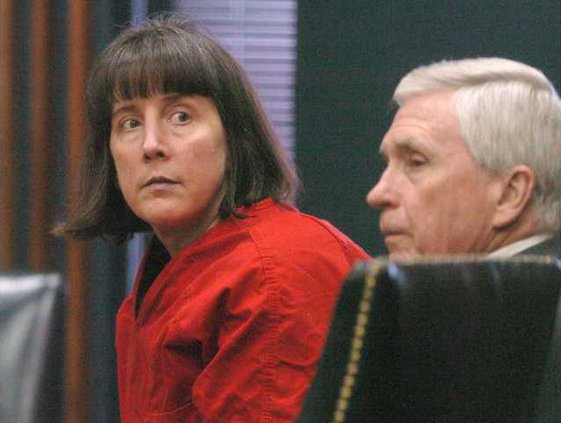HUNTSVILLE, Ala. - A professor accused of gunning down six colleagues, three fatally, used a gun purchased in 1989 for her husband and denied killing anyone after the rampage at the University of Alabama in Huntsville, a police investigator testified Tuesday.
Amy Bishop, making her first court appearance, was denied bond during a brief hearing. The capital murder case against her was sent to a grand jury.
Looking gaunt and wearing a red jail jump suit, the handcuffed Bishop made no comment during the proceeding.
The Harvard-educated biologist, who is listed as 44 on school records, was arrested shortly after the Feb. 12 shooting that left three dead and three people wounded in a small conference room.
During the hearing, Huntsville police investigator Charlie Gray testified that the gun used in the shooting, found in a bathroom trash can on a floor below, was purchased in 1989 for her husband, James Anderson, through a man in New Hampshire identified as Donald Proulx.
Gray said Proulx told federal agents Anderson, who was living in Massachusetts, asked him to buy the gun because Anderson was having problems with a neighbor and New Hampshire didn't have a waiting period for gun purchases.
Anderson was not in the courtroom for the hearing. He previously told The Associated Press that he knew about the gun and joined Bishop in target practice.
Gray testified that Anderson, during a taped interview that lasted more than two hours, was not agitated but "seemed calm, she seemed very intelligent" as she denied anything to do with the shooting.
"She said it was no way she was there, no way it happened. 'I wasn't there.' That kept being a reoccurring thing throughout the interview," Gray said.
Bishop is charged with capital murder, which can bring the death penalty if convicted, although prosecutors have not made a decision on whether they will seek a death penalty.
Her attorney, Roy Miller, has said he will argue that Bishop was insane. He has told reporters she has shown signs of being unable to relate to reality.
District Judge Ruth Ann Hall issued a gag order last week for the prosecution, defense and law enforcement personnel, barring them from talking to the media. Hall says the order will ensure a fair trial.
At the time of the shooting, Bishop was in her last semester of teaching at UAH, which had denied her the job protections of tenure. Colleagues said she was angry over the tenure decision. The university fired her after the rampage.
Gray testified that Anderson told police his wife "had been a little depressed over tenure but she had been about normal" on the day of the shooting.
Bishop's arrest after the Alabama shooting led to revelations about her role in other cases, including shooting her 18-year-old brother to death in the family's suburban Boston home in 1986. That death was ruled an accident at the time and she was not charged, but authorities in Massachusetts have ordered an inquest into the case.
Bishop and her husband were also questioned in the 1993 mailing of a pipe bomb to a medical researcher who had given her a negative job review. They were never charged, but the U.S. attorney in Boston is reviewing the matter.

